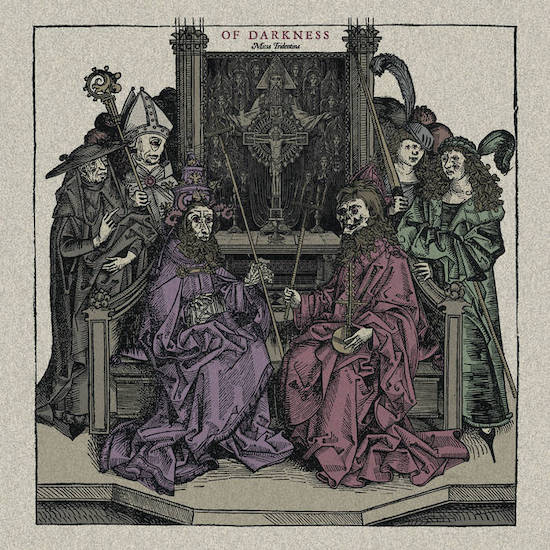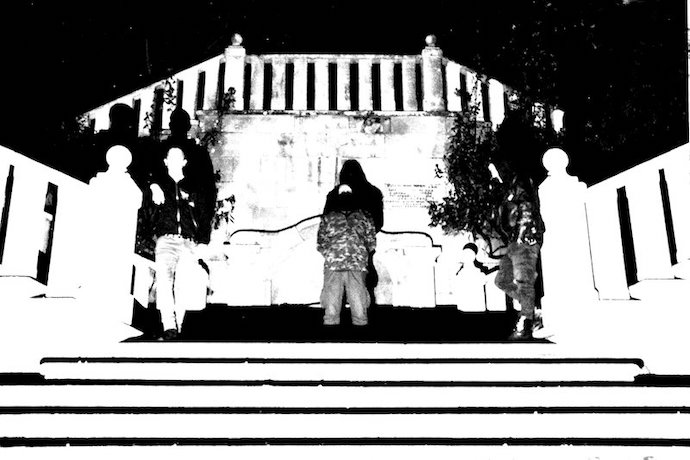
Of Darkness is an unusual band in many respects. Its three members also play in such significantly better-known Spanish groups as Graveyard, Teitanblood, and Balmog, yet the earliest recordings from Of Darkness are at least as old as all of those. A glance at the Of Darkness discography suggests that although their recorded output has been scattered and unpredictable, something about it continues to exert a hold on their imaginations. Like an ember that grows so cold it might seem to have been extinguished, some new oxygen unexpectedly causes it to burn again.
But that’s just a start to what’s unusual. In addition, we’re told that the band never rehearse, and rather just improvise in the studio while recording. They composed, recorded, arranged, and mixed their new album Missa Tridentia in three days, which may make you wonder why eight years have elapsed since their last album, which in turn followed their first demos by a decade or more.
And then there’s the album credits, which recount that all three members contributed “orchestral arrangements”.
We might mention that their last album was also their first one — and that it was a tribute to the modern classical composer Krzysztof Penderecki, the author of such works as “Threnody to the Victims of Hiroshima” and an opera named The Devils of Loudun, as well as many sacred works — though the members of Of Darkness are themselves said to hold “extreme nihilistic beliefs”.
And to these facts we’ll add one more significant observation: Although it’s not out of place to consider their new album under the headings of “funeral doom” and “orchestral metal”, it’s far from a conventional example of either genre.

Although created with improvisational techniques and divided into seven tracks, each of them bearing Latin titles and ecclesiastical references, Missa Tridentia was conceived and performed as a single massive composition, and thus the tracks should be considered as parts of a larger orchestral work.
That fact means that listening to individual tracks selected for premieres such as this one loses context, i.e., the way in which the pieces move from one to another and fit together in the whole. But still, you definitely should listen to “Dies Irae“, the piece we’re presenting today. But to get some sense of the context, you should first listen to “Requiem Aeternam“, the first track that was made public in the run-up to the album’s release, because it immediately precedes “Dies Irae” in the running order (these are the second and third songs on the track list).
Like other titles on this album, “Requiem Aeternam” has a liturgical reference, in this case a prayer to the almighty to hasten the release of departed souls from Purgatory and grant them eternal rest. Its significance as a title chosen by Of Darkness is mysterious (at least to us), but the music is daunting in the extreme. It seems to portray death and fear as endless, and salvation an illusion.
Solemn in its pace and massive in its sound, it includes ravaged chords that drag and claw and drums that boom like widely spaced bombs. The music moans and wails, and harrowing roars, terrorizing screams, and soaring chants echo forth, seemingly from cavernous spaces. Gloom and grief reach oppressive levels, and tones of both instrumental and vocal agony also pierce the mind, boiling in madness and despair.
Near the end, symphonic strings and horns blurt and quiver above cold winds and apparitional voices, less crushing and crazed but no less frightening than what has preceded it.
And now we come to “Dies Irae“. For those whose Latin is rusty, it means “the Day of Wrath”, used as the title of a medieval Latin poem which (per this source) “describes the Last Judgment, the trumpet summoning souls before the throne of God, where the saved will be delivered and the unsaved cast into eternal flames”. Numerous musical compositions have been set to the words, most significantly compositions which take as their text the Roman Catholic funeral mass, in which the “Dies Irae” sequence once played an important role in the liturgy.
Here, the cadence of the musical procession is even slower, even more beleaguered and crushing as the music heaves and staggers. The reverberations crackle with corrosive distortion, the drums still detonate with megaton power, and the variant vocals again make the hair stand up on a listener’s neck. High above, eerie ethereal tones flicker and become fevers of torment.
The immensity and heaviness of the music is stupefying, and the combination of abyssal growls and tortured warbling wails is frightening. As it goes, it seems to rise like a horrifying monument, only cut short because it’s about to segue into the next track.
As the source cited above explains, there’s a reason why the Roman church removed the “Dies Irae” sequence from the funeral mass 50 years ago — because it was seen as over-emphasizing judgment, fear, and despair, replaced by other texts that were seen as “urging Christian hope and arguably giving more effective expression to faith in the resurrection.” Of Darkness resurrect all the negative meanings that were excised (or at least that’s how we hear it).
As for what comes both before and after these two songs, we will have more to say in due course. But just these two should be enough to convince you that this album is a work of stunning power and harrowing conviction.
Missa Tridentia is set for international release by Personal Records on August 25th on CD and digital formats. Pre-orders are available now:
PRE-ORDER:
https://personal-records.bandcamp.com/album/missa-tridentina
OF DARKNESS:
https://www.facebook.com/ofdarknessrequiem

Marduk releases new album “memento mori” in september!!!!!!!!!!!!